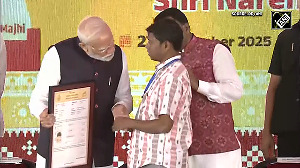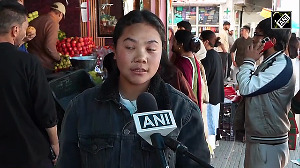Leading historians from Pakistan participating at the Indian History Congress on Sunday flayed the Pervez Musharraf government for 'distortion' of history in Pakistani school textbooks, saying that their government had resorted to 'subversion' of history and 'perpetration' of half-truths.
The seven-member Pakistani delegation, which is at the IHC on the invitation of the Indian Council of Cultural Research, said the Musharraf government was making conscious efforts to ensure that history textbooks 'toed the government line'.
Mubarak Ali, head of the delegation, told PTI that like-minded historians in Pakistan were fighting against this phenomenon. "It has become a state policy to inculcate ideas that suit a particular ideology. This is unacceptable and flawed," he said.
The process of distortion, he alleged, was carried out in an 'elaborate and sophisticated' manner; particular events and personalities, which suited the government's liking, were selected to be part of the textbooks and interpretation of these subjects was strictly coherent with the government's stand.
The historian, who is facing as many as four first information reports for his reportedly 'progressive outlook' and rigid stand against religious fundamentalism, claimed that this distortion began right at the madrasa level.
The delegation arrived in Shantiniketan on Saturday and are attending the Congress, the largest annual congregation of peers in the sub-continent on personal invitations from IHC.
Asked whether the people in Pakistan were keen on educational exchanges with India, Ali said Pakistanis, in general, had no acrimonious feelings towards India and many students and historians wanted to visit India as part of 'people-to-people dialogue' process in recent times.
Ali, a leading facilitator in this process himself, said a major demand emerging in Pakistan was that both governments take a 'deeper look' at the present practice of mandatory reporting to police by Pakistanis or Indians in one another's country. "This adds to the element of mistrust", he said.





